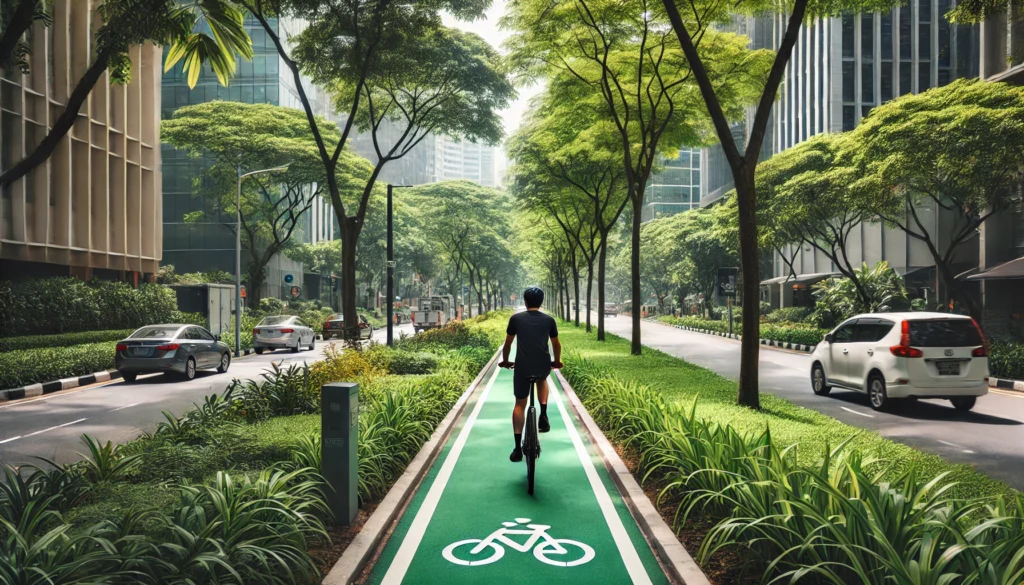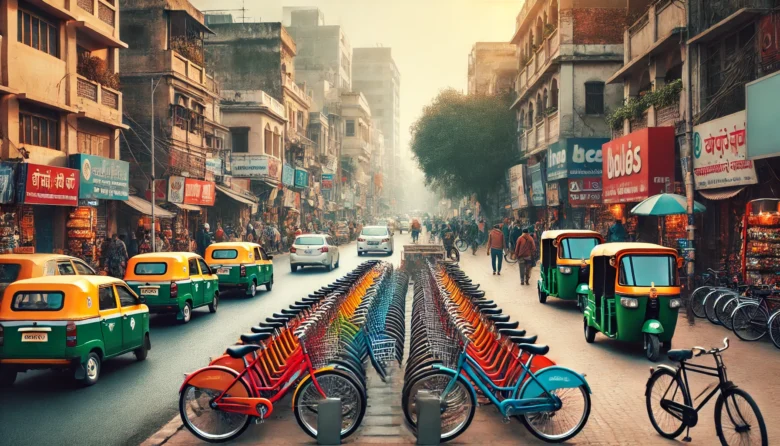India’s urban landscapes are changing rapidly; with it, so is how we move around our cities. A key player in this transformation is the humble bicycle. More specifically, bicycle-sharing programs are emerging as a sustainable, convenient, and healthy alternative to traditional modes of transport. Let’s delve into the world of sustainable urban mobility and explore how bicycle-sharing programs are making a difference in India.
The Rise of Bicycle-Sharing Programs
Bicycle-sharing programs have overtaken the world, and India is no exception. These programs allow users to rent bicycles from various docking stations scattered across the city. Users can pick up a bike at one station and drop it off at another, making it an incredibly flexible mode of transport. Due to traffic congestion, this system promotes using bicycles for short trips, often quicker than using cars or public transport.
In India, cities like Bengaluru, Pune, and Delhi are leading the way with successful bicycle-sharing schemes. These programs reduce traffic congestion and lower pollution levels, promoting a healthier environment.
How It Works
Using a bicycle-sharing program is simple and user-friendly. Most programs operate through a mobile app that allows users to locate, unlock, and pay for bicycle rentals. Here’s a quick step-by-step guide on how these systems typically work:
Download the App: Find the bicycle-sharing app for your city and download it onto your smartphone.
Register: Sign up using your phone number or email address.
Locate a Bicycle: Use the app to find the nearest docking station with available bicycles.
Unlock: Scan the QR code on the bike to unlock it.
Ride: Enjoy your ride! Follow traffic rules and stay safe.
Return: Drop off the bike at any docking station near your destination and lock it.

Benefits of Bicycle-Sharing Programs
Environmental Impact
Bicycle-sharing programs play a significant role in reducing our carbon footprint. By opting for a bicycle instead of a car or motorcycle for short trips, we can reduce greenhouse gas emissions. This is crucial in combating climate change and improving air quality in our cities.
Health Benefits
Cycling is an excellent form of exercise. It helps build muscle, improve cardiovascular health, and reduce stress. By integrating cycling into our daily commute, we can lead healthier lives. Bicycle-sharing programs make it easier for people to adopt this healthy habit.
Cost-Effective
Compared to other forms of transportation, bicycle-sharing is highly affordable. Most programs offer flexible payment options, including pay-per-ride, daily passes, and monthly subscriptions. This makes it accessible to many people, including students and low-income groups.
Convenience
With docking stations spread throughout the city, bicycle-sharing programs offer unmatched convenience. They are handy for the first and last mile of a journey, bridging the gap between public transport stations and final destinations.
Challenges and Solutions
Infrastructure
One of India’s most significant challenges for bicycle-sharing programs is the need for dedicated cycling infrastructure. Many cities lack proper bike lanes, making cycling unsafe. However, cities like Bengaluru and Pune are making strides in developing better cycling infrastructure, setting a positive example for others to follow.
Public Awareness
Raising awareness about the benefits of cycling and bicycle-sharing programs is crucial. Many people still need to learn how these programs work and the advantages they offer. Educational campaigns and community engagement can help bridge this gap.
Maintenance
Maintaining the bicycles and docking stations can be a logistical challenge. Regular maintenance ensures the safety and reliability of the service. Companies like Yulu (a popular bicycle-sharing service in India) have dedicated teams for regular checks and repairs, providing a smooth user experience.
Vandalism and Theft
Vandalism and theft are concerns for any public sharing program. Implementing robust security measures such as GPS tracking and secure locking systems can mitigate these issues. Additionally, involving the community in caring for the bicycles can foster a sense of ownership and responsibility.
Successful Models in India
Yulu
Yulu is a leading bicycle-sharing company in India, operating in cities like Bengaluru, Pune, and Mumbai. Yulu bicycles are known for their lightweight design and ease of use. The company uses a mobile app for rentals. It has an extensive network of docking stations, making it a convenient option for daily commuters.
MYBYK
MYBYK operates in Ahmedabad and Gandhinagar, providing a seamless cycling experience. It partners with public transport systems to offer integrated services, making it easier for users to switch between bicycles and public transport. This holistic approach has made MYBYK a popular choice among commuters.
SmartBike
SmartBike operates in cities like Hyderabad and New Delhi, offering high-quality bicycles for short trips. The company focuses on providing reliable and efficient service, well-maintained bikes, and user-friendly technology. SmartBike has also collaborated with local governments to expand its reach and improve urban mobility.
The Future of Bicycle Sharing in India
The future looks promising for bicycle-sharing programs in India. With increasing urbanization and the need for sustainable transport solutions, these programs are poised for growth. Here are a few trends to watch out for:
Expansion to Smaller Cities
While bicycle-sharing programs are currently concentrated in major cities, there is immense potential for expansion into smaller towns and cities. These areas often face less traffic congestion and have a greater scope for cycling infrastructure development.
Integration with Public Transport
Seamless integration with public transport systems will enhance the convenience of bicycle-sharing programs. By offering combined tickets and synchronized services, users can easily switch between different modes of transport, making their commute more efficient.
Technological Advancements
Advances in technology will continue to improve the user experience. Features like real-time tracking, predictive maintenance, and AI-powered route suggestions can make bicycle sharing even more attractive to users.
Community Engagement
Engaging with the community and involving them in the planning and implementing of bicycle-sharing programs can lead to higher adoption rates. Community-led initiatives and feedback mechanisms can tailor the services to meet local needs.
Conclusion
Bicycle-sharing programs are a sustainable, healthy, and cost-effective solution to the urban mobility challenges Indian cities face. By reducing traffic congestion, lowering pollution levels, and promoting a healthier lifestyle, these programs are making our cities more livable and enjoyable. As we look to the future, continued investment in cycling infrastructure, public awareness, and technological advancements will be critical to the success of these programs. Let’s embrace this green revolution and pedal our way to a brighter, cleaner future!
Author’s Note
Thank you for taking the time to read about the exciting potential of bicycle-sharing programs in India. As we move towards more sustainable living, every small step counts. I hope this blog inspires you to consider using a bicycle for your next short trip and contribute to a greener future.
G.C., Ecosociosphere contributor.
References and Further Reading
- The Rise of Bike-Sharing Programs in India
- How Bicycle Sharing is Transforming Indian Cities
- Landon Branch, TX | The Patel Firm Injury Accident Lawyers. https://thepatelfirm.com/landon-branch-tx/
- Your Ultimate Guide To Car-Free Travel in Toronto – Medallion Corporation. https://medallioncorp.com/your-ultimate-guide-to-car-free-travel-in-toronto/
- Your #SGID17 x oBike Promo Code is Here! | Indesign Live: Interior Design and Architecture. https://www.indesignlive.sg/singaporeindesign/obike-promo
- How Smart Energy Management Is Fueling the Future of EV?. https://bizbrolly.com/how-smart-energy-management-is-fueling-the-future-of-ev/
- The Impact and Advantages of Longboarding on Urban Transportation | Skateboard Manufacturers. http://www.skateboard-manufacturers.com/the-impact-and-advantages-of-longboarding-on-urban-transportation/
- Bike to the Match – Galway Cycling Campaign. https://www.galwaycycling.org/bike-to-the-match/
- The Benefits of Routine Utility Vehicle Maintenance. https://golfcartrentalsthevillagesfl.com/the-benefits-of-routine-utility-vehicle-maintenance/
- From Frustration to Resolution Overcoming Cargo Claims Challenges – IFS Blog. https://www.ifssac.com/blog/en/from-frustration-to-resolution-overcoming-cargo-claims-challenges/
- Blue Line Bus Service Islamabad Contact Number | Address. https://findnumber.pk/blue-line-bus-service-islamabad/
- 5 Tech Based Drone Startups in India Transforming the Industry. https://channeltimes.com/story-2/5-tech-based-drone-startups-in-india-transforming-the-industry/
- Moreno, F. (2023). Traffic congestion and management in Zamboanga City, Philippines: The public transport commuters’ point of view. https://core.ac.uk/download/574203535.pdf
- Evictionism – Wikipedia. https://en.wikipedia.org/wiki/Evictionism
- deutsche bank investment banking 2021. http://insightcirclepublishing.com/elt7x2e/deutsche-bank-investment-banking-2021-04963e




